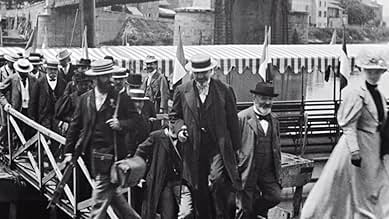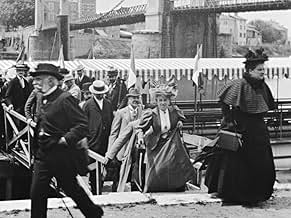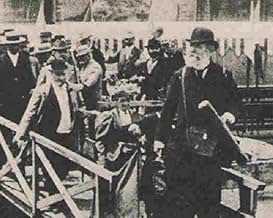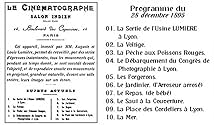AVALIAÇÃO DA IMDb
5,7/10
2,1 mil
SUA AVALIAÇÃO
Adicionar um enredo no seu idiomaThe photographers who need to participate in the congress of Lyon get off a boat in Neuville-sur-Saône, dividing to the right and left.The photographers who need to participate in the congress of Lyon get off a boat in Neuville-sur-Saône, dividing to the right and left.The photographers who need to participate in the congress of Lyon get off a boat in Neuville-sur-Saône, dividing to the right and left.
- Direção
- Artistas
P.J.C. Janssen
- Self
- (não creditado)
Avaliações em destaque
Louis Lumiere was a businessman. Since he was in the photographic business (his families factory in Lyon, France produced what many considered to be the best treated glass plates used in photography at that time - the mid 1890s), he was also a photographer. But, I am sure, he considered himself first-and-foremost a scientist. He considered his new invention, the Cinematopgraph, to be a scientific instrument. That is why during 1894 and 1895, he spent quite a bit of effort to gain approbation from various scientific groups. He wanted to keep the photographic community, in which he was well known, appraised of his endeavors. One method of doing this was to attend, in June 1895, a congress of photographers that was gathering at Neuville-Sur-Soane - a town just a short distance north of Lyon.
Louis positioned his camera at the base of a gangplank down which delegates to the conference descended from a Soane river ferry. Certainly, all of the descending men and women knew, by that time, of Louis' invention - although it had not yet been made public. Later that evening the Lumiere brothers showed the congress attendees eight of their less-than-one-minute films. And in one of these films the members saw themselves descending from the boat.
Louis positioned his camera at the base of a gangplank down which delegates to the conference descended from a Soane river ferry. Certainly, all of the descending men and women knew, by that time, of Louis' invention - although it had not yet been made public. Later that evening the Lumiere brothers showed the congress attendees eight of their less-than-one-minute films. And in one of these films the members saw themselves descending from the boat.
To many historians, December 28, 1895, is the date considered as the day where cinema was born, as it was in that cold day of winter when the brothers Auguste and Louis Lumière gave the first public screening of their new invention, the Cinématographe. The brothers' devise would change history of entertainment forever, as it took the idea of motion pictures from the uncomfortable and individual experience of Edison's Kinetoscope, to the more enjoyable atmosphere of a movie projected on a screen. On that day the brothers showed 10 films, and the majority of them were of the kind that later would be known as "actuality films", movies showing an everyday event. However, one of the 10 films was a bit more than a typical "actuality film", as it was actually the register of an event in a fashion more akin to what we know now as documentary films: it was the arrival of the Photographical Congress to Lyon.
While December 28, 1895, was certainly the very first time the brothers showed their invention to the world, it wasn't really the first time the brothers' invention was shown to an audience, as months earlier, the brothers had been doing private screenings for the scientific community of France. The 1895 Photographical Congress that was celebrated at the community of Neuville-sur-Saône in Lyon, was one of the places where the Lumières screened their films for the first time. "Neuville-sur-Saône: Débarquement du congrès des photographes à Lyon", is essentially the recording of the arrival of the members of the Photographical Congress to Neuville-sur-Saône, marking the first time a camera was used to capture something more "special" than people moving or trains arriving. This time the new medium was being used to actually register the event in real time, pretty much in the same way as TV News work today.
Nevertheless, that was not the only thing that "Neuville-sur-Saône" an interesting early short film. The movie was shot when the Congress arrived, early in the morning, and that very same day was shown to its protagonists in the afternoon. One has to wonder how the photographers felt when they saw the images of their arrival actually moving, as if the even was being enacted again. The very same people that looked into the camera (perhaps thinking it was a normal photography) was now watching themselves in a motion picture depicting short seconds of their lives. It was certainly a unique experience, and no doubt the success of "Neuville-sur-Saône: Débarquement du congrès des photographes à Lyon" and their other films that day prompted the brothers to keep working in their preparation for that December day, when the world witnessed what a group of photographers did (and saw) months ago. 7/10
While December 28, 1895, was certainly the very first time the brothers showed their invention to the world, it wasn't really the first time the brothers' invention was shown to an audience, as months earlier, the brothers had been doing private screenings for the scientific community of France. The 1895 Photographical Congress that was celebrated at the community of Neuville-sur-Saône in Lyon, was one of the places where the Lumières screened their films for the first time. "Neuville-sur-Saône: Débarquement du congrès des photographes à Lyon", is essentially the recording of the arrival of the members of the Photographical Congress to Neuville-sur-Saône, marking the first time a camera was used to capture something more "special" than people moving or trains arriving. This time the new medium was being used to actually register the event in real time, pretty much in the same way as TV News work today.
Nevertheless, that was not the only thing that "Neuville-sur-Saône" an interesting early short film. The movie was shot when the Congress arrived, early in the morning, and that very same day was shown to its protagonists in the afternoon. One has to wonder how the photographers felt when they saw the images of their arrival actually moving, as if the even was being enacted again. The very same people that looked into the camera (perhaps thinking it was a normal photography) was now watching themselves in a motion picture depicting short seconds of their lives. It was certainly a unique experience, and no doubt the success of "Neuville-sur-Saône: Débarquement du congrès des photographes à Lyon" and their other films that day prompted the brothers to keep working in their preparation for that December day, when the world witnessed what a group of photographers did (and saw) months ago. 7/10
This film is a virtual remake of 'Sortie d'Usine', perhaps making it the first self-referential movie. Instead of the workers streaming out of the factory, we have fellow cinematograph specialists disembarking a liner for a congress. Instead of workers silently doing their masters' bidding, we have colleagues, friends, peers, fearlessly greeting the camera as equals.
This is a film about film - the Congressionists walk with their cameras; this film was precessed immediately for viewing at the conference. Already, the Lumieres' desire to 'objectively' record the world has turned into a naval-gazing admission of defeat, of the impossibility of objectivity untainted by subjectivity or ideology. Godard once suggested that the most honest film would be of a camera recording itself in a mirror. This film is an early grasping of what he means.
This is a film about film - the Congressionists walk with their cameras; this film was precessed immediately for viewing at the conference. Already, the Lumieres' desire to 'objectively' record the world has turned into a naval-gazing admission of defeat, of the impossibility of objectivity untainted by subjectivity or ideology. Godard once suggested that the most honest film would be of a camera recording itself in a mirror. This film is an early grasping of what he means.
10PCC0921
This film, along with nine other films, were shown at a Paris, mini-film festival, by pioneering filmmakers, the Lumiere brothers, in December of 1895. Most film historians place this date as the start of the film industry. The third movie ever shown to a paying audience, actually says a lot in its short 37 second runtime. The photographers disembark off of a passenger ferry in Neuville-sur-Saône, Rhône, France. Try to remember these guys aren't politicians, but photographers, assembling for a big meeting. The backdrop view of the bridge reminded me of various times in my life when I took a boat trip near a bridge that size. It created some nostalgia for me, which is the prime point of enjoying pioneering films from the silent era. Getting off a boat, feeling the waves underneath, taking in the fresh outside air, speaks volumes here. There are various restorations I found on YouTube for this film, that are really good. If you search you can find perfect versions of this movie.
I thought it was interesting seeing the photographers, tipping their hats to the film cameraman. It showed a respect between the photographers and the cinematographer himself. Being in the 21st century now and seeing it from this point of view, the first thing you think about is, a lot of these guys might lose their jobs someday to this new medium called moving pictures. They were having so much fun, assembling for their photography meeting, they didn't realize they were looking into their future, through the film camera lens of this new medium. Photography had been around for almost 60 years by this point and it begs to wonder if they felt threatened by the new technology that was looking them in the eye. The men coming off the boat created an atmosphere of foreshadowing. It was a preview of an era of innovations, that was coming to the world soon.
9.9 (A+ MyGrade) = 10 IMDB.
I thought it was interesting seeing the photographers, tipping their hats to the film cameraman. It showed a respect between the photographers and the cinematographer himself. Being in the 21st century now and seeing it from this point of view, the first thing you think about is, a lot of these guys might lose their jobs someday to this new medium called moving pictures. They were having so much fun, assembling for their photography meeting, they didn't realize they were looking into their future, through the film camera lens of this new medium. Photography had been around for almost 60 years by this point and it begs to wonder if they felt threatened by the new technology that was looking them in the eye. The men coming off the boat created an atmosphere of foreshadowing. It was a preview of an era of innovations, that was coming to the world soon.
9.9 (A+ MyGrade) = 10 IMDB.
Neuville-sur-Saône: Débarquement du congrès des photographes à Lyon (1895)
The title of this Lumiere Brothers film pretty much tells you what you're looking at. We see a group of people walking off a riverboat and coming close to the camera who catches their every move. There's certainly nothing ground-breaking about this early "actuality" movie but if you're a fan of these then you're bound to enjoy this one. I always enjoy watching these because it gives you a great chance to see how things were so many years ago. This one here features a lot of people so you get a terrific idea of the type of clothing that was worn during this period as well as a chance to see the various other things going on. This here is well worth watching if you enjoy these movies.
The title of this Lumiere Brothers film pretty much tells you what you're looking at. We see a group of people walking off a riverboat and coming close to the camera who catches their every move. There's certainly nothing ground-breaking about this early "actuality" movie but if you're a fan of these then you're bound to enjoy this one. I always enjoy watching these because it gives you a great chance to see how things were so many years ago. This one here features a lot of people so you get a terrific idea of the type of clothing that was worn during this period as well as a chance to see the various other things going on. This here is well worth watching if you enjoy these movies.
Você sabia?
- ConexõesEdited into The Lumière Brothers' First Films (1996)
Principais escolhas
Faça login para avaliar e ver a lista de recomendações personalizadas
Detalhes
- Data de lançamento
- País de origem
- Idioma
- Também conhecido como
- The Photographical Congress Arrives in Lyon
- Locações de filme
- Empresa de produção
- Consulte mais créditos da empresa na IMDbPro
- Tempo de duração
- 1 min
- Cor
- Mixagem de som
- Proporção
- 1.33 : 1
Contribua para esta página
Sugerir uma alteração ou adicionar conteúdo ausente





















